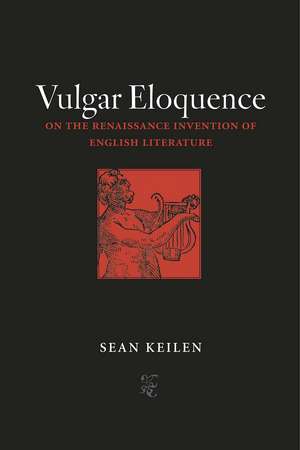Vulgar Eloquence: On the Renaissance Invention of English Literature
Autor Sean Keilenen Limba Engleză Hardback – 11 iul 2006
This original book challenges prevailing accounts of English literary history, arguing that English literature emerged as a distinct category during the late sixteenth century, as England’s relationship with classical Rome was suffering an unprecedented strain. Exploring the myths through which poets such as Geffrey Whitney, William Shakespeare, and John Milton understood the nature of their art, Sean Keilen shows how they invented archaic origins for a new kind of writing.
When history obliged English poets to regard themselves as victims of the Roman Conquest rather than rightful heirs of classical Latin culture, it also required a redefinition of their relations with Roman literature. Keilen shows how the poets’ search for a new beginning drew them to rework familiar fables about Orpheus, Philomela, and Circe, and invent a new point of departure for their own poetic history.
When history obliged English poets to regard themselves as victims of the Roman Conquest rather than rightful heirs of classical Latin culture, it also required a redefinition of their relations with Roman literature. Keilen shows how the poets’ search for a new beginning drew them to rework familiar fables about Orpheus, Philomela, and Circe, and invent a new point of departure for their own poetic history.
Preț: 433.63 lei
Preț vechi: 563.16 lei
-23% Nou
Puncte Express: 650
Preț estimativ în valută:
82.98€ • 88.73$ • 69.18£
82.98€ • 88.73$ • 69.18£
Carte tipărită la comandă
Livrare economică 18 aprilie-02 mai
Preluare comenzi: 021 569.72.76
Specificații
ISBN-13: 9780300110128
ISBN-10: 030011012X
Pagini: 240
Ilustrații: 26 b-w illus.
Dimensiuni: 140 x 210 x 21 mm
Greutate: 0.45 kg
Editura: Yale University Press
Colecția Yale University Press
ISBN-10: 030011012X
Pagini: 240
Ilustrații: 26 b-w illus.
Dimensiuni: 140 x 210 x 21 mm
Greutate: 0.45 kg
Editura: Yale University Press
Colecția Yale University Press
Notă biografică
Sean Keilen is assistant professor of English at the University of Pennsylvania.
Recenzii
"Keilen rethinks the package of ideas and facts we call antiquarianism, so that antiquarian is the last thing they seem."—Annabel Patterson, author of Nobody's Perfect
"Keilen possesses an original, unclassifiable intelligence. He weaves elegantly philological arguments about the antique into a counterplot that illuminates a nativist, unrefined, and hybrid early modern England. Vulgar Eloquence will make us rethink the Spenser-to-Shakespeare-to-Milton canon, not by throwing out classicism and tradition, but by redefining it."—Leonard Barkan, Princeton University
